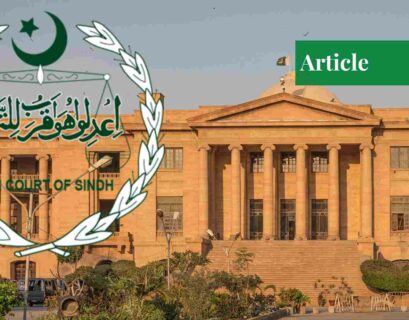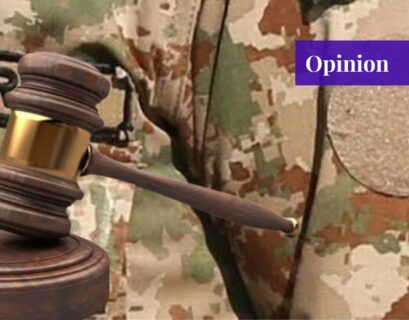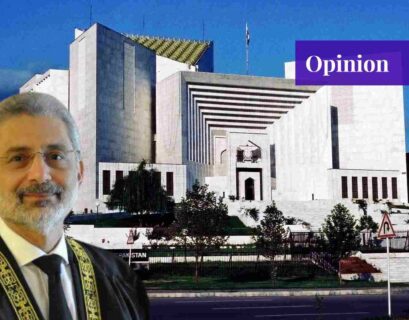Ms. Amina Iqbal is studying international relations at Kinnaird College for Women University, Lahore.
Supreme Court of Pakistan
In the hierarchy of courts, the Supreme Court of Pakistan is the state’s highest judicial body having ultimate appellate authority. The prime function is to interpret the Constitution, decide on constitutional cases, and ensure the protection of fundamental rights. The final authority on legal and constitutional matters lies in the hands of the Supreme Court of Pakistan.

The Supreme Court has its seat in Islamabad, but it has circuits in other cities such as Lahore, Karachi, Peshawar, and Quetta. The Supreme Court’s formation, jurisdiction, powers, and functions are all detailed in the Constitution. The requirements and way of appointment of judges, the term of retirement, the grounds and mode of dismissal, and the conditions of employment of judges are all closely linked.
Structure
At the apex of the judicial system of Pakistan lies the Supreme Court and it is composed of a Chief Justice known as the Chief Justice of Pakistan and numerous additional justices as specified by an Act of Parliament. Furthermore, the President of Pakistan elects the Chief Justice, but other judges only after consulting with the Chief Justice.
Jurisdiction
The jurisdiction is divided into original, appellate, and advisory jurisdiction. The Supreme Court has exclusive power to issue declaratory judgments in any conflict between the federal government and a provincial government, or between any two or more provincial governments. If the Supreme Court believes that a matter of public importance involving the enforcement of any of the basic rights guaranteed by the Pakistani Constitution is implicated, it has the power to issue any adequate order for the enforcement of fundamental rights.
The Supreme Court has jurisdiction to hear and decide appeals against verdicts, decrees, final decisions, or penalties issued by a high court, the Federal Shariat Court, or the services appellate tribunals. If the President believes that it is essential to get the Supreme Court’s view on any legal matter of public importance, he may refer the question to the Court for consideration at any time. The Supreme Court considers the question brought to it and submits its decision to the President.
High Courts

All four provinces and the capital have their own high courts. The four high courts of the provinces have general responsibility over the administration of justice within their respective territorial borders. The high court serves as an appellate court for all civil and criminal cases in the province. Hence, Articles 192 to 203 of Part VII of the Constitution deal with the operation of the high court.
Structure
A high court is composed of a Chief Justice and as many other judges as prescribed by law or appointed by the President.

Jurisdiction
Under the Constitution, the high court has two jurisdictions: original and appellate jurisdiction. According to the Constitution, a High Court has original jurisdiction:
- Ordering a person within the Court’s territorial jurisdiction to refrain from doing anything prohibited by law or to do something required by law.
- Stating that an act was performed without legitimate authority has no legal consequence.
- Ordering that a person in custody be brought before the court to ensure that he is not being held unlawfully.
- Providing such direction to any person or entity, for the enforcement of any of the fundamental rights guaranteed by the Constitution. Aside from the Constitution’s original jurisdiction, a High Court possesses original jurisdiction in a variety of other areas given by or under other statutes.
A High Court has broad appellate jurisdiction over civil and criminal court verdicts, decisions, decrees, and punishments.
Federal Shariah Court
The Federal Shariah Court has been established to investigate and decide if any provision of law conflicts with Islamic injunctions as outlined in the Holy Quran and the Sunnah of the Prophet (peace be upon him). If a statute is deemed to be unconstitutional, the court must notify the appropriate level of government and explain its reasoning. The court also has jurisdiction to review any criminal court decision regarding the use of Hudood punishments.
The Supreme Court also has a Shariat Appellate Bench that can examine the decisions of the Federal Shariat Court decisions. Furthermore, Article 277 states that all current laws must be brought into compliance with Islamic injunctions, and Chapter 3-A deals with the functions and organization of the Federal Shariah Court.
Federal Shariah Court has original and appellate jurisdiction. The court has sole authority to hear appeals from criminal court decisions relating to the implementation of Hudood law, i.e., rules about intoxication, theft, Zina (unlawful sexual intercourse), and Qazf (false imputation of Zina).
Civil Courts
Civil courts in Pakistan are organized under the jurisdiction and oversight of the High Court within each respective province. The high court exercises general superintendence and control over all civil courts. The primary classes of civil courts, as stipulated by the Civil Courts Ordinance 1962, are the following.
- The Court of District Judge,
- The Court of Additional District Judges,
- The Civil Court
These courts operate within the framework of the laws established by each province, providing a structured hierarchy for the administration of civil justice throughout the country.
Criminal Courts
The criminal procedure in Pakistan is primarily governed by the Code of Criminal Procedure 1868, outlining the process and rules for conducting criminal proceedings. On the other hand, the Pakistan Penal Code 1860 defines crimes and prescribes punishments for various offenses. The main criminal courts in Pakistan are mentioned below.
- High Court
- Sessions Court
- Court of Magistrate
Special Courts and Tribunals
In Pakistan, specialized courts and tribunals are established to handle specific types of cases. These include special courts for offences in banks and recovery of bank loans, Customs Act special courts, traffic courts, commercial courts, drug courts, labour courts, insurance appellate tribunals, income tax appellate tribunals, accountability courts, anti-terrorism courts, etcetera.
Appeals from these special courts typically go to the High Courts, except for labour courts and special traffic courts, which have their distinct forums for appeals, enhancing the efficiency and expertise in adjudicating matters related to their respective domains.
Conclusion
To sum it up, the hierarchy of courts in Pakistan embodies a complex structure aimed at administering justice and upholding the rule of law. At its zenith stands the Supreme Court of Pakistan, functioning as the paramount authority for legal and constitutional affairs. With its power to interpret the Constitution, safeguard fundamental rights, and provide declaratory judgments, the Supreme Court holds a significant role in guiding legal proceedings across the state.
The hierarchy extends to the high courts, the Federal Shariah court, the civil courts, the criminal courts, and the specialized tribunals, each playing vital roles in addressing specific legal issues. Additionally, the establishment of special courts and tribunals underscores the need for targeted resolution in distinct areas of law. This structured legal framework, supported by the appellate system, exemplifies Pakistan’s diversified and sophisticated legal landscape, ensuring fairness, efficiency, and adherence to justice and Islamic law.
If you want to submit your articles, research papers, and book reviews, please check the Submissions page.
The views and opinions expressed in this article/paper are the author’s own and do not necessarily reflect the editorial position of Paradigm Shift.



















